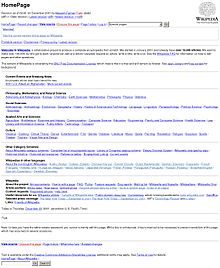Graphs are unavailable due to technical issues. There is more info on Phabricator and on MediaWiki.org. |

Wikipedia, a free-content online encyclopedia written and maintained by a community of volunteers known as Wikipedians, began with its first edit on 15 January 2001, two days after the domain was registered.[2] It grew out of Nupedia, a more structured free encyclopedia, as a way to allow easier and faster drafting of articles and translations.
The technological and conceptual underpinnings of Wikipedia predate this; the earliest known proposal for an online encyclopedia was made by Rick Gates in 1993,[3] and the concept of a free-as-in-freedom online encyclopedia (as distinct from mere open source)[4] was proposed by Richard Stallman in 1998.[5]
Stallman's concept specifically included the idea that no central organization should control editing. This contrasted with contemporary digital encyclopedias such as Microsoft Encarta and Encyclopædia Britannica. In 2001, the license for Nupedia was changed to GFDL, and Jimmy Wales and Larry Sanger launched Wikipedia as a complementary project, using an online wiki as a collaborative drafting tool.[6]
While Wikipedia was initially imagined as a place to draft articles and ideas for eventual polishing in Nupedia, it quickly overtook its predecessor, becoming both draft space and home for the polished final product of a global project in hundreds of languages, inspiring a wide range of other online reference projects.
In 2014, Wikipedia had approximately 495 million monthly readers.[7] In 2015, according to comScore, Wikipedia received over 115 million monthly unique visitors from the United States alone.[8] In September 2018, the projects saw 15.5 billion monthly page views.[9]
- ^ "Wikistats - Statistics For Wikimedia Projects". stats.wikimedia.org. Wikimedia Foundation. Retrieved 11 February 2022.
- ^ "Wikipedia.org WHOIS, DNS, & Domain Info – DomainTools". WHOIS. Archived from the original on 17 April 2017. Retrieved 24 October 2016.
- ^ "Wikipedia of Jimmy Wales and Larry Sanger". History Computer. 2010. Archived from the original on 15 April 2012. Retrieved 9 November 2013.
- ^ "Philosophy". GNU. Archived from the original on 14 October 2013. Retrieved 5 November 2013.
- ^ Cite error: The named reference
stallmanencyclopediawas invoked but never defined (see the help page). - ^ "WikiHistory". WikiWikiWeb. Archived from the original on 21 June 2002. Retrieved 15 May 2013.
- ^ "The future of Wikipedia: WikiPeaks?". The Economist. 1 March 2014. Archived from the original on 8 April 2014. Retrieved 2 April 2014.
- ^ "comScore Ranks the Top 50 U.S. Digital Media Properties for January 2015". comScore. 24 February 2015. Archived from the original on 17 March 2015. Retrieved 17 March 2015.
- ^ "Monthly overview". Wikimedia statistics. Wikimedia Foundation. Archived from the original on 24 January 2020. Retrieved 31 May 2019.